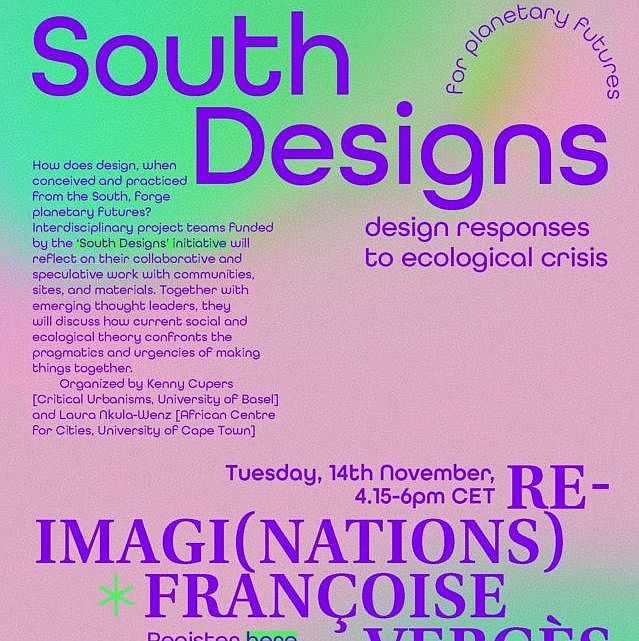STUDENT REFLECTIONS ON THE PUBLIC CONVERSATION WITH YEMOH ODOI, MAUD HOUSSAIS AND FRANÇOISE VERGÈS

Hannah Hother, Samuel Giraut, Nadja Nievergelt | 2023
Within the framework of the public conversation series South Designs: Planetary Futures, which explores how design, thought and practiced from the South, forges planetary futures, students from Critical Urbanisms are asked to share their reflections on the respective conversation and how each speaker answers to the question; What do design responses to ecological crisis look like when they are grounded in the aspirations and struggles of those most affected, predominantly residing in the Global South? Three reflections from students on the public conversation with Yemoh Odoi, Maud Houssais and Françoise Vergès, focusing on the question, what does planetary ecology mean from the perspective and lifeworld of those displaced, have been selected to be published.
Hannah Hother states that “in the intricate web of urban scholarship, activism, and professional practice, the principles of decolonial feminism are challenging the entrenched hegemonic order standing against the oppressive forces of patriarchy, capitalism and colonial legacies.” Taking decolonial feminism as a lens, “urban spaces become not just physical environments but vibrant arenas for the continual unravelling of oppressive narratives and the reconstruction of equitable, empowered communities.”
Samuel Giraut reflects on the discussion of “ […] Yemoh Odoi and Françoise Vergès with a concrete example of a labour system built and still functions on the prohibition of family ties: single-sex hostels in South Africa. Having done a Master’s research in Johannesburg within the pericentral neighbourhood of Jeppestown, I know these infrastructures and social worlds from the literature and interviews. By looking at the literature, I aim to look at how this specific example can participate in unpacking imbrication between racialisation, exploitation, disenfranchisement and prohibition of family ties.”
“Safety is essential, as we are only able to properly prosper within its existence, making it therefore a fundamental human right” is from where the reflections of Nadja Nievergelt depart. She reflects on the contradiction of “safety […] in its essence [is] a sanctuary […]” and the fact that “110 million people worldwide are forcibly displaced […]”. Referring to the series City of Joy that “ […] depicts the traumatic and horrendous events in the Democratic Republic of Congo (DRC)”, she calls for not taking safe spaces for granted but “[…] to recognize the contributions of places like “City of Joy” and support such efforts that empower people to heal and reclaim their lives.”
Quick Links
